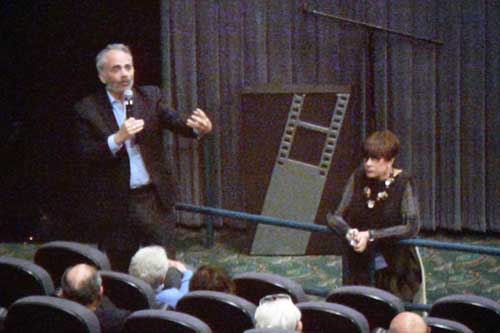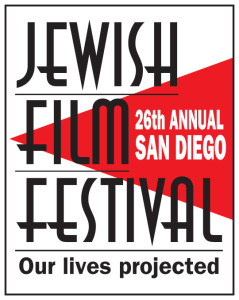
By Donald H. Harrison

 SAN DIEGO – A movie about an Israeli boy who drops a Torah in his Moroccan Jewish neighborhood prompted a discussion at the San Diego Jewish Film Festival on Wednesday, Feb. 10, about the time that the wooden roller of a Torah scroll rolled off the reader’s table and onto the bima during the most recent High Holiday services at Congregation Beth Israel.
SAN DIEGO – A movie about an Israeli boy who drops a Torah in his Moroccan Jewish neighborhood prompted a discussion at the San Diego Jewish Film Festival on Wednesday, Feb. 10, about the time that the wooden roller of a Torah scroll rolled off the reader’s table and onto the bima during the most recent High Holiday services at Congregation Beth Israel.
Rabbi Michael Berk, Congregation Beth Israel’s senior rabbi, told a crowd who stayed at the Festival following the showing of the movie Encirclements that there is no specific Jewish law concerning the dropping of a Torah, but rather there are minhagim, or customs, that vary around the world.
In the movie, after Aharon drops the Torah, he fasts an excessive number of nights and days, an act of genuine repentance that not only helps to make matters spiritually right between his community and God, but which also prompts his parents to examine deeply their relationships to him and to each other.
After the real-life Beth Israel mishap, in which the scroll of the Torah ended up draped between the roller on the floor and the reader’s table, the three rabbis of the congregation decided to undertake a one-day fast. Rabbi Berk said that the level of concern and emotion in the Reform congregation regarding the fallen Torah was palpable.
Encirclements is a translation of the Hebrew word “hakifot,” which describes the joyful Shabbat and holiday ceremony in which a Torah is taken out of the Holy Ark, and then taken through the sanctuary where it is touched with the corner of prayer shawls or with prayer books.
In the movie, however, the hakifot occurred on the streets of the metropolitan Tel Aviv neighborhood, with many members in the procession having asked Aharon, as the one chosen by their rabbi for this special occasion, to say a special prayer for them. One man asked Aharon to pray for his reunification with a girl he loved back in Morocco. Aharon’s father asked him to pray for a brother or a sister, whereas his mother – who had suffered a number of miscarriages – told him that she did not want to become pregnant again.
One might debate whether Aharon accidentally dropped the Sephardic Torah in its metal casing, or whether he purposely let it slip from his hands so that he would not have to choose between the wishes of his parents.
The thought-provoking movie was described by Judy Friedel as the “centerpiece” because it was shown at exactly the halfway point of the San Diego Jewish Film Festival. Friedel and her husband, Bill, were special sponsors of the movie, which also drew support from, among others, Congregation Beth Israel and the Men’s Club of Tifereth Israel Synagogue, the latter of which Bill Friedel serves as treasurer.
*
Harrison is editor of San Diego Jewish World. He may be contacted via donald.harrison@sdjewishworld.com. Comments intended for publication in the space below must be accompanied by the letter writer’s first and last name and by his/ her city and state of residence (city and country for those outside the U.S.)